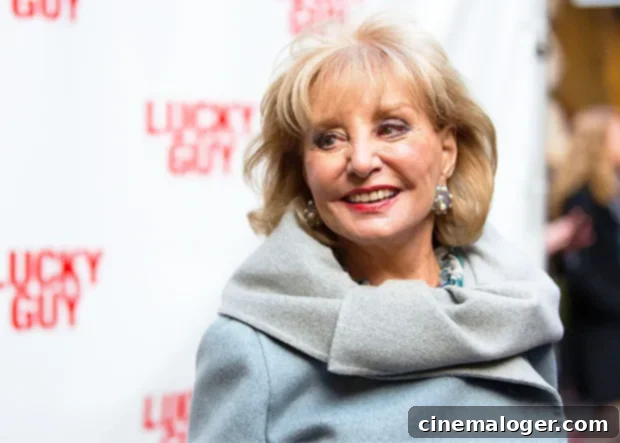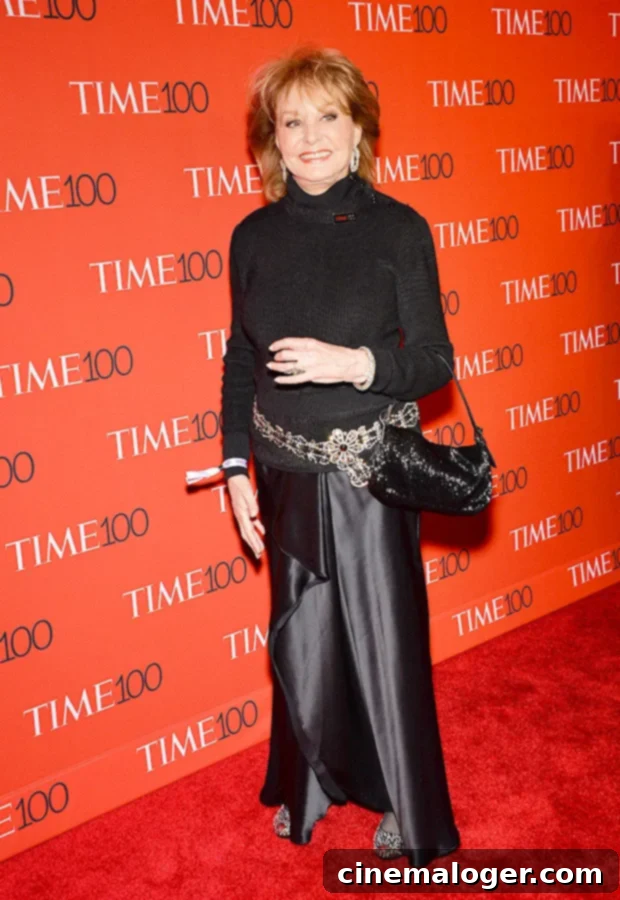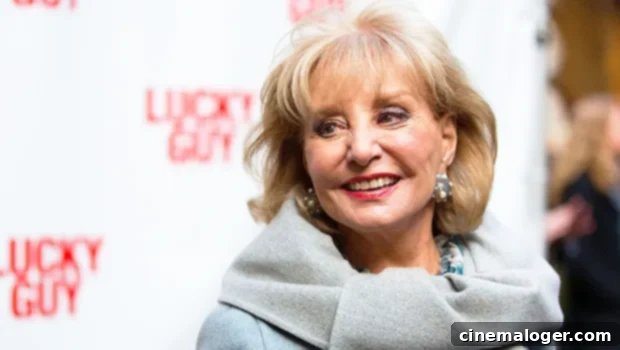Barbara Walters: Remembering a Broadcast Journalism Icon and Trailblazer Who Redefined Television
The world of broadcast journalism mourns the loss of one of its most legendary figures, Barbara Walters, who passed away peacefully at her New York City home on Friday, December 30, at the remarkable age of 93. A true pioneer and an indelible force, Walters’ career spanned over five decades, during which she carved a path for women in media, became a household name synonymous with insightful interviews, and co-created one of daytime television’s most enduring programs, The View.
Her representative confirmed the news to HollywoodLife, stating that she “passed away peacefully in her home surrounded by loved ones. She lived her life with no regrets. She was a trailblazer not only for female journalists, but for all women.” This sentiment echoes the widespread admiration and respect Walters commanded throughout her illustrious career, a testament to her unyielding determination and transformative impact on the industry.
Almost immediately following the announcement, tributes began to pour in from across the entertainment and news landscape. Colleagues, celebrities, political figures, and millions of viewers shared their condolences and recounted personal anecdotes, highlighting Walters’ profound influence. Among them were many of her former co-hosts from The View, including the outspoken Rosie O’Donnell, all acknowledging the extraordinary legacy she leaves behind.
Walters was more than just a journalist; she was an institution. With her signature coiffed blonde bob, her calm yet commanding demeanor, and her distinctive voice, she became a constant presence on seminal news programs like NBC’s Today, ABC’s 20/20, and the ABC Evening News. Her ability to connect with subjects, from world leaders to Hollywood legends, set her apart and defined an era of television journalism.
Early Life and the Rise to Stardom: Breaking Barriers at NBC
Born in Boston, Massachusetts, in 1929, Barbara Jill Walters’ early life was marked by her father Lou Walters’ career as a nightclub owner and entertainment producer, exposing her to the world of show business from a young age. After graduating from Sarah Lawrence College in Bronxville, New York, in 1951, Walters initially dipped her toes into advertising before finding her true calling in television. Her journey into broadcast journalism began with local news affiliates, where she quickly demonstrated a natural aptitude for the demanding field.
In 1961, Walters joined NBC’s Today show as a writer and researcher, a role that, while behind the scenes, allowed her to gain invaluable experience. Soon, she was offered an on-air position, often referred to as the “Today Girl.” At the time, this role was largely ornamental, typically filled by women who would read commercials and handle lighter segments. However, Walters, with her sharp intellect and journalistic ambition, refused to be confined by such limitations. She began to expand her duties, contributing significant stories, conducting her own interviews, and demonstrating a profound grasp of news and current events.
Her tenacious pursuit of substantive journalism gradually transformed the “Today Girl” role into that of a respected co-host. By 1974, she had officially earned the title of co-host, a groundbreaking achievement for a woman in an era when male voices dominated news desks. Her exceptional work and pioneering spirit were recognized with her first Emmy Award in 1975, solidifying her status as a serious and impactful journalist. Barbara Walters didn’t just break the glass ceiling; she shattered it, paving the way for countless women who aspired to careers in broadcast news.

Pioneering Primetime: From ABC Evening News to Iconic Interviews
Walters’ ambition and talent soon led her to even greater heights. In 1976, she made history again by becoming the first female co-anchor of a network evening news program, joining Harry Reasoner on the ABC Evening News. This move was monumental but also fraught with challenges. The pairing faced initial difficulties and public scrutiny, highlighting the resistance that often met women pushing into traditionally male-dominated roles. Despite the obstacles, Walters’ presence on the evening news was a significant step forward for gender equality in journalism.
Following her tenure on the evening news, Walters found a perfect home at ABC’s investigative newsmagazine, 20/20. It was here that her unique interviewing style truly flourished, cementing her reputation as a formidable and empathetic journalist. Known for her direct, yet respectful, questioning and her calm demeanor, she had an uncanny ability to disarm her subjects and elicit candid responses. She became wildly popular, and her interviews were appointment television, offering viewers unprecedented access to the world’s most influential and intriguing personalities.
Beyond 20/20, Walters launched her highly successful Barbara Walters Specials, a series of primetime interviews that became a television staple. These specials showcased her unparalleled talent for sitting down with figures from every sphere imaginable. Her list of interviewees reads like a who’s who of the 20th and 21st centuries: revolutionary leaders like Fidel Castro, powerful politicians such as Donald Trump and Vladimir Putin, entertainment legends including Fred Astaire, Michael Jackson, Barbra Streisand, Sir Laurence Olivier, and Betty White, among countless others. Her interviews were celebrated for their depth, their ability to reveal the human side of powerful figures, and often, for making headlines themselves.
The Birth of “The View”: A Revolution in Daytime Television
In 1997, Barbara Walters embarked on another groundbreaking venture, co-creating and launching the daytime talk show The View. Her vision for the program was simple yet revolutionary: a panel of women of different generations, backgrounds, and viewpoints, discussing current events, social issues, and popular culture. The concept was to offer “the view” from multiple perspectives, fostering lively and often spirited debates.
Walters served as the show’s moderator and a primary voice alongside original co-hosts Star Jones, Joy Behar, Debbie Matenopoulos, and Meredith Vieira. The View quickly became a cultural phenomenon, distinguished by its blend of serious discussion and lighthearted banter. It provided a platform for female voices to openly express their opinions on a wide range of topics, a format that was largely absent from television at the time. Walters’ careful curation of the panel and her ability to guide discussions, even through heated disagreements, was crucial to the show’s success.
Throughout her tenure on The View, Walters continued to conduct high-profile interviews, bringing many of her exclusive conversations to the show. Her presence lent the program immense credibility and gravitas. While she officially retired from her full-time role on the program in 2014, making her final regular appearance in 2015, the talk show has remained wildly popular and continues to thrive, a lasting testament to her innovative concept and enduring influence on daytime television.

A Life Beyond the Camera: Personal Journeys and Resilience
Beyond her groundbreaking career, Barbara Walters’ personal life also drew public interest, characterized by resilience and the challenge of balancing a demanding public persona with private experiences. She was married four times to three different men. Her first marriage was to Robert Henry Katz in 1955, which ended in annulment in 1958. In 1963, she married theatre producer Lee Guber. Together, they adopted their daughter, Jacqueline Dena Guber, in 1968, after Walters faced struggles with conception. This marriage lasted 13 years, concluding in 1976.
Her relationship with television CEO Merv Adelson was a unique chapter, embodying a “third time’s the charm” scenario that eventually saw them marry twice. They first tied the knot in 1981, divorced in 1984, and then remarried in 1986, only to divorce again in 1992. Despite the separations, Walters maintained a profound respect and affection for Adelson. She told the New York Times that the late Merv was a “kind and gentle man” and that they “stayed friends long after their marriage,” a testament to her ability to navigate complex personal relationships with grace and dignity.
Walters often spoke about the difficulties of maintaining a personal life while pursuing such an intense public career, a sentiment many women in high-profile roles can relate to. Her honesty about her personal journey, including the joy of motherhood and the complexities of her marriages, endeared her to many and further solidified her image as a relatable, yet extraordinary, woman.
An Enduring Legacy: Impact on Journalism and Women
Barbara Walters officially retired from regular television hosting in 2014, but her influence and legacy will resonate for generations. She was more than just a journalist; she was a cultural icon who shaped the landscape of television news and entertainment. Her meticulous preparation, her empathetic approach, and her fearless questioning style became benchmarks for interviewers worldwide.
Her contributions to journalism were vast: she broke gender barriers, proved that women could be authoritative and respected voices in hard news, and created new formats for engaging with public figures. Walters won numerous awards throughout her career, including multiple Emmy Awards, a Lifetime Achievement Award from the National Academy of Television Arts and Sciences, and a star on the Hollywood Walk of Fame, among many others. These accolades only begin to tell the story of her profound impact.
She mentored countless aspiring journalists, particularly women, who saw in her a powerful example of what was possible. Her trailblazing journey from the “Today Girl” to a network co-anchor, a primetime interviewer, and a successful show creator, inspired millions. Barbara Walters didn’t just report the news; she made history, not only through the stories she told but through the life she lived and the barriers she overcame. Her wealth of classic interviews and her enduring influence on the style and format of broadcast television will last long beyond her lifetime.
HollywoodLife sends our deepest condolences to the friends, family, and countless admirers of this luminary star. Barbara Walters’ voice may have signed off for the last time, but her legacy as a broadcast journalism pioneer and a beacon for women in media will continue to shine brightly.
